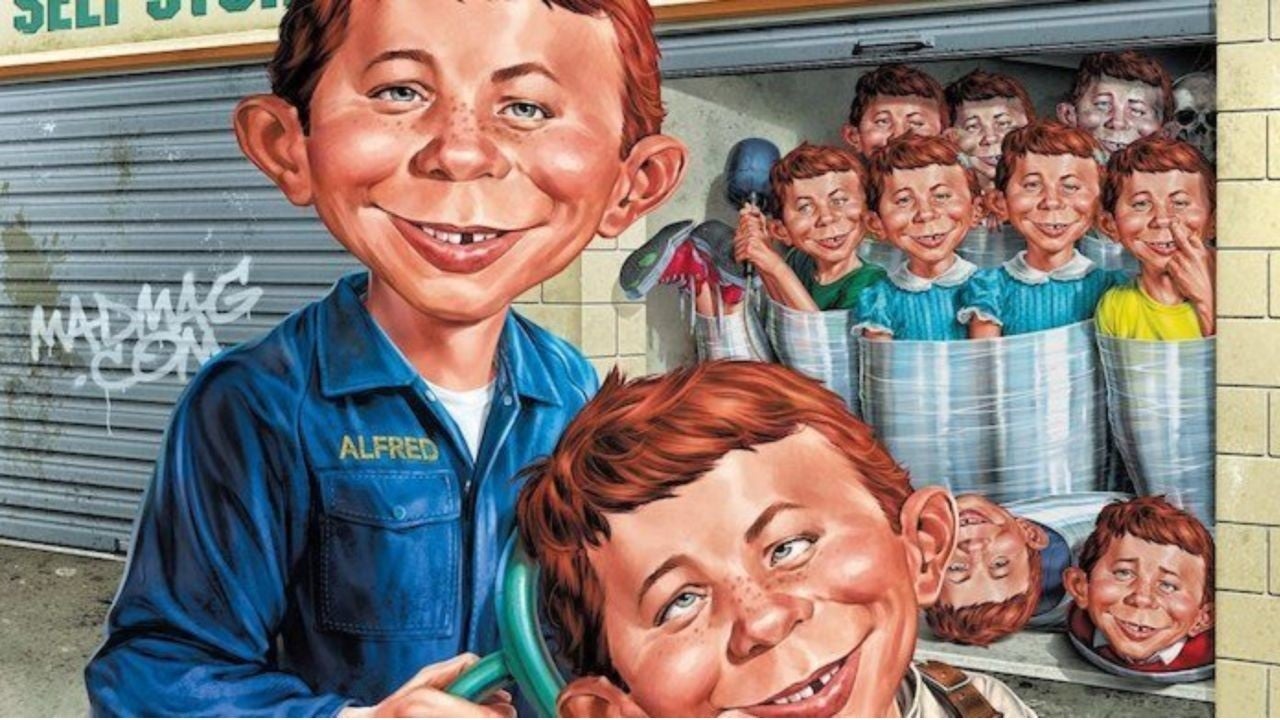Anti-establishment humor wasn’t mainstream in the 1950s, and grown-ups saw comic books as brain-rotting garbage. But in 1952, a comic came along which would come to proudly declare: “In Trash We Trust.” Born in the era of McCarthyism, kids who read MAD learned to distrust authority and give snappy answers to stupid questions. The “Usual Gang of Idiots” spoofed politics, advertising, teachers, parents, and themselves, becoming a cultural institution. By its heyday, a movie couldn’t call itself a blockbuster until it was parodied by MAD. It was subversive, stupid, forever on target, and unapologetically “cheap” at whatever the price.
What’s My Shine?
Mad #17 November 1954
Before becoming the premiere parody magazine teaching young readers to distrust all authority, MAD was a comic book spoofing other comics. Archie became the juvenile delinquent “Starchie,” who ran a hall-pass racket. “Superduperman” beat up old folks and showed inappropriate interest in Lois Pain, “Girl Reporter.” Political cracks formed when cartoonist Jack Davis subpoenaed Senator Joseph McCarthy to testify on a spoof of the game show What’s My Line?, where the notorious red-baiting witch-hunter gets a little help from Machiavellian ventriloquist Roy Cohn.
First Issue: The New MAD
MAD #24 July 1955
MAD changed to a magazine format in July 1955. Free from the strict Senate Committee-dictated Comics Code Authority standards, it rebranded its editorial staff as “The Usual Gang of Idiots,” and took on a new mission statement: “Humor in a jugular vein.” To underscore the significance, the cover promised “inside you will find a very important message.” But all the message said was “Please buy this magazine!” It also marked the first time Alfred E. Neuman asked “What? Me worry?”
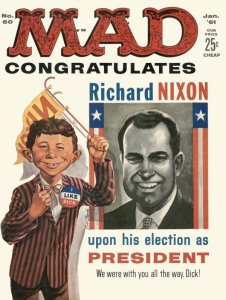
MAD Congratulates John Kennedy
MAD #60 January 1961
The 1960 Presidential election was close, but no surprise to MAD which hit stands proclaiming “Mad congratulates John Kennedy upon his election as president. We were with you all the way Jack!” The issue was shipped before votes were even counted, so how could they have been so sure? They weren’t. If flipped and read upside down, the issue congratulated Richard Nixon on his amazing win, which they’d always known was coming. Stores just had to display the right side.
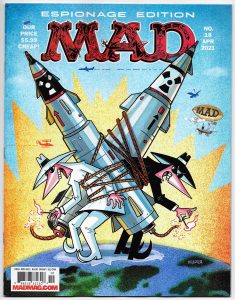
Spy vs Spy
MAD #18 April 2021
When Antonio Prohías was president of the Cuban Cartoonists Association, he published anti-Batista cartoons. When Fidel Castro took power, Prohías criticized the new regime and was accused of working for the CIA. Worried he was putting his co-workers in danger, the suspected spy escaped to America to imperil the writers at MAD instead. Conceived at the height of the Cold War, “Spy vs. Spy” reduced nuclear anxiety to cynical slapstick. It starred two secret agents concocting elaborate schemes of Mutually Assured Destruction. The spies debuted in January 1961 but didn’t infiltrate the cover until 2021.

Who Needs You, Vietnam issue
MAD #126 April 1969
When America needed soldiers during the World Wars, recruiters appealed to patriotism with iconic posters of Uncle Sam saying “I want you.” When the army needed fresh bodies to toss into the minefields of Vietnam, Alfred E. Neuman dismissed the crass commercialism by asking “Who needs you?” MAD aligned with the counterculture. They warned about the realities of draft induction doctors’ smiles, and showed Archie and Jughead enlisting in the army because cops were beating so many protesters, they figured Vietnam was safer.
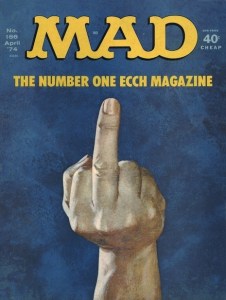
We’re Number One
MAD #166 April 1974
MAD was at a peak period, with nearly 2 million subscribers, in April 1974. There were no bigger gross-out periodicals, and none came close to its disgusting depths. MAD was pumping out so much waste, they sold rolls of their own brand of toilet paper. With a realistically painted middle finger standing at attention, they declared themselves “The Number One Ecch Magazine.” The cover was barred from store shelves. It was the only time publisher William Gaines publicly apologized.
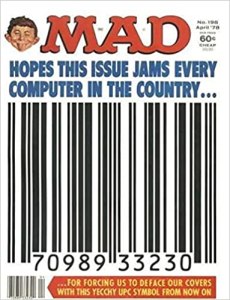
Mad’s first barcode
MAD #198 April 1978
Feeling hypocritical about taking money from advertisers they would rather skewer, MAD didn’t run any (real) ads for 44 years, starting in 1957. So, when Universal Product Codes started invading supermarkets in 1974, the magazine held out. They felt the barcodes marred the craftsmanship of their hand-drawn covers. When they were required to include a UPC for scanning purposes in 1978, MAD protested by featuring a cover code so exaggerated they hoped it would screw up every checkout in the country.
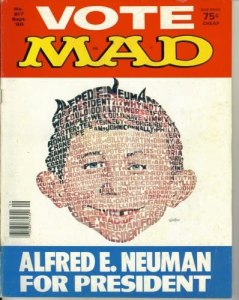
Alfred E. Neuman for President 1980
Mad #217 September 1980
The 1980 Presidential election was a squeaker that was mislabeled as a mandate. Ronald Reagan took 50.6% of the vote to unseat the incumbent. Split the difference and you might find MAD readers tipped the balance by voting for a gap-toothed dark horse. “Alfred E. Neuman for President?!? Why not? We could do a lot worse. For example, we could have Jimmy Carter, Ted Kennedy, George Bush, Ronald Reagan…” The list went on to include such improbable-but-preferable choices like King Kong and Alice Cooper.
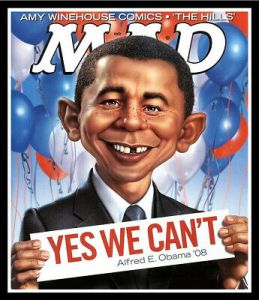
Yes We Can’t, the Alfred E. Obama cover
MAD #493 September 2008
Barack Obama’s campaign phrase, “Yes we can,” was sunny, optimistic, and bright. In celebrating his historic win, MAD was not quite so cheerful, hedging as always, with a cover banner reading “Yes we can’t.” It initially embraced the newly-elected president as one of its own, merging its mascot with the chief commander to form Alfred E. Obama. The honeymoon was over by February, 2009, when MAD came out with Obama – The First 100 Minutes. In an era of hope, it was a hopeless issue.
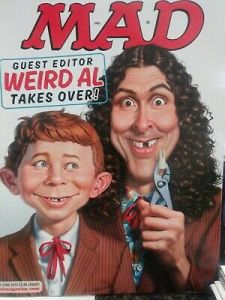
“Weird Al” Yankovic as guest editor
MAD #533 April 2015
In many respects, “Weird Al” Yankovic was the audio version of MAD. His music was one of the few things the magazine respected. MAD’s first guest editor couldn’t have become “Weird Al” without the pages which shaped a generation’s humor, or the legal precedent it set for song parody. Irving Berlin sued when a 1961 MAD songbook turned “A Pretty Girl Is Like a Melody” into the hypochondriac ode “Louella Schwartz Describes Her Malady.” The Appeals Court ruled in favor of the magazine.
